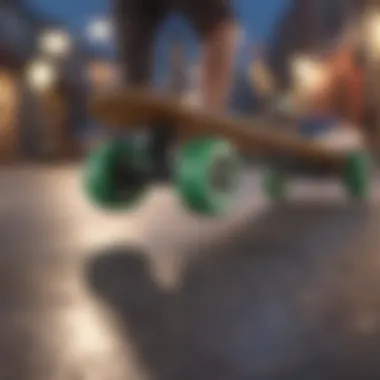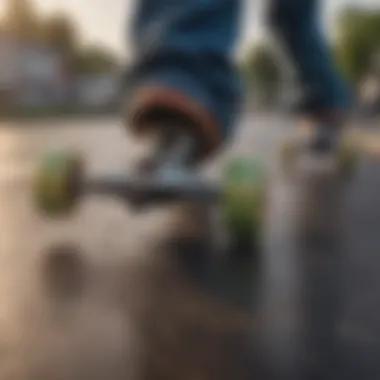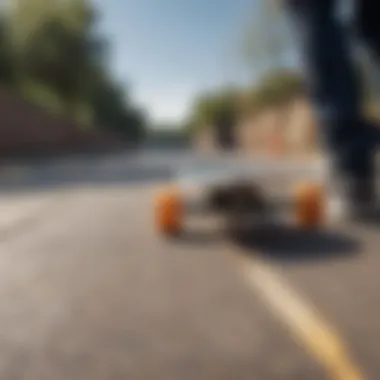Expert Guide to Choosing the Ideal Skateboard for Beginners


Skateboard Selection Essentials
Are you considering embarking on the exhilarating journey of skateboarding? Whether you're entranced by the idea of gliding effortlessly through urban landscapes or seeking a thrilling new movement hobby, choosing the right skateboard as a novice is pivotal in ensuring a conducive and safe learning experience.
Comprehensive Skateboard Components Guide
Delving into the realm of skateboards can initially seem overwhelming with the multitude of components comprising this essential piece of equipment. Understanding the intricate details of decks, trucks, wheels, and bearings is fundamental in making an informed decision that aligns with your preferences and skill level.
Prioritizing Safety Features
Safety should undoubtedly be at the forefront of your mind when selecting a skateboard as a beginner. The inclusion of features like grip tape for enhanced foot traction, reliable wheel quality for stability, and durable board material can significantly reduce the risk of falls or mishaps during practice sessions.
Maneuverability Matters
The ability to maneuver your skateboard efficiently is not only crucial for your progress but also impacts the enjoyment of the sport. Exploring the versatility of different skateboard shapes, sizes, and designs can aid in determining which board offers the fluidity and control necessary for honing your skills seamlessly.
Introduction
Skateboarding is not just a sport but a way of life for many enthusiasts. For beginners stepping into the world of skateboarding, the choice of the right skateboard is paramount. This article serves as a guiding light for novices embarking on their skating journey. Understanding the nuances of skateboard components, safety features, and maneuverability is crucial for making an informed decision.
Understanding Skateboard Components
Deck
The deck of a skateboard is like its soul, providing the foundation for the entire skating experience. Typically made of maple wood, the deck's key characteristic lies in its concave shape, which enhances flip tricks and control. This curvature is a popular choice for beginners as it offers stability while allowing for versatile maneuvers. However, the downside of a concave deck is that it may feel less comfortable for cruising long distances.
Trucks
Trucks are the axles of the skateboard, connecting the wheels to the deck. The key characteristic of trucks is their width, which determines stability and turning radius. Wider trucks provide more stability, ideal for beginners learning to balance, while narrow trucks offer sharper turns suited for advanced tricks. The unique feature of trucks lies in their ability to be customized for tight or loose turns, each option having its advantages and disadvantages.
Wheels


Wheels play a crucial role in determining the ride's smoothness and speed. The key characteristic of wheels is their hardness, measured on a durometer scale. Softer wheels offer better grip and shock absorption, beneficial for cruising and rough surfaces. Meanwhile, harder wheels excel in smooth surfaces and tricks due to their reduced grip. Choosing the right wheel hardness is essential for the intended style of skating.
Bearings
Bearings are the unsung heroes of a skateboard, enhancing wheel rotation and speed. The key characteristic of bearings is their ABEC rating, indicating precision and smoothness. Higher ABEC ratings provide better performance but may come at a higher cost. The unique feature of bearings lies in their maintenance demands, as keeping them clean and lubricated is vital for optimal performance.
Safety Features to Consider
Grip Tape
Grip tape covers the deck's surface, offering traction for the skater's shoes. Its key characteristic is the adhesive surface that ensures a secure foothold during tricks and maneuvers. While grip tape enhances control and prevents slipping, it requires periodic replacement due to wear and tear.
Helmet
A helmet is a non-negotiable safety essential for skateboarders, protecting the head from impacts and injuries. Its key characteristic is the hard shell construction and internal padding, offering shock absorption and comfort. While helmets may feel cumbersome, their unique feature of safeguarding against head injuries far outweighs any discomfort.
Pads
Protective pads shield key areas like elbows and knees from abrasions and impacts while skating. Their key characteristic lies in the durable material and adjustable straps for a secure fit. Pads offer peace of mind for beginners trying new tricks or navigating challenging terrain. However, the bulkiness of pads could hinder fluid movements during advanced maneuvers.
Maneuverability and Control
Board Size
The board size directly influences stability and maneuverability on a skateboard. Larger boards provide a more stable platform for beginners to balance and learn basic techniques. Conversely, smaller boards offer increased maneuverability and responsiveness, ideal for tricks and street skating. Finding the right balance between size and agility is crucial for enhancing the skating experience.
Wheel Hardness
Wheel hardness affects the ride's smoothness and adherence to different terrains. Softer wheels offer better shock absorption and grip, suitable for cruising and rough surfaces. Conversely, harder wheels excel in smooth surfaces, providing speed and slide capabilities for technical tricks. Balancing wheel hardness with riding preferences ensures optimal performance on various surfaces.
Truck Tightness
Truck tightness determines the responsiveness of the skateboard's turning capabilities. Tighter trucks offer stability and control, ideal for high-speed rides and downhill skating. Conversely, looser trucks prioritize sharp turns and quick maneuvers, suitable for street skating and technical tricks. Adjusting truck tightness enables skaters to fine-tune their riding experience as per their skill level and preferences.


Types of Skateboards for Beginners
Choosing the right type of skateboard for beginners is crucial as it sets the foundation for a skater's learning journey. In this article, we delve into three primary types: Cruiser Boards, Longboards, and Street Skateboards. Each type caters to different preferences and riding styles, offering distinct advantages and considerations.
Cruiser Boards
Cruiser Boards are characterized by their compact size, making them ideal for commuting and cruising around town. Their shorter deck length and softer wheels provide a smooth ride on rough surfaces, enhancing stability for beginners. These boards are maneuverable, making them suitable for navigating crowded urban environments. Beginners often appreciate Cruiser Boards for their versatility and ease of use, allowing for casual riding and basic tricks.
Longboards
Longboards feature elongated decks, offering ample foot space and stability for beginners. Their larger wheelbase and softer wheels absorb bumps efficiently, ensuring a comfortable and controlled ride. Longboards excel in downhill cruising and carving, emphasizing smooth turns and low-speed control. Beginners looking for a relaxed riding experience and enhanced stability often opt for Longboards to hone their skills gradually.
Street Skateboards
Street Skateboards, also known as Trick Boards, are designed for performing technical tricks and maneuvers in skate parks and urban settings. With smaller deck sizes and harder wheels, Street Skateboards are responsive and offer excellent pop for executing tricks like ollies and kickflips. Beginners interested in street skating and mastering flip tricks gravitate towards Street Skateboards for their agility and performance-oriented design.
Factors to Consider When Choosing a Skateboard
When embarking on the journey to select the ideal skateboard for beginners, several crucial factors demand meticulous consideration. In this detailed exposition on the nuances of skateboarding initiation, understanding the significance of various elements in choosing the right skateboard is paramount. Each factor plays a pivotal role in ensuring a seamless and enjoyable skating experience, aligning with the unique needs and preferences of the individual rider.
Skill Level
One of the fundamental aspects to contemplate when delving into the realm of skateboarding is the assessment of skill level. Beginners often grapple with mastering the basics of balancing, pushing, and performing simple maneuvers. Hence, selecting a skateboard that aligns with the novice's skillset is critical in fostering steady progress and skill development. For those in the rudimentary stages of skateboarding, opting for a board that offers stability and maneuverability is advisable. As proficiency grows, riders can gradually transition to boards that cater to more advanced tricks and techniques.
Budget
The financial aspect is a pragmatic consideration that cannot be overlooked when delving into the realm of skateboarding. Budget constraints can significantly influence the selection process, guiding beginners towards options that strike a balance between affordability and quality. While it may be tempting to splurge on high-end skateboards brimming with features, it is crucial to weigh budgetary constraints against the desired specifications. By setting a reasonable budget and exploring diverse skateboard models within that range, beginners can find a board that meets their needs without compromising on quality or performance.
Preferred Riding Style
Understanding one's preferred riding style is pivotal in narrowing down the myriad options available in the skateboarding market. Whether inclined towards cruising down peaceful streets, conquering sharp turns and slopes, or executing awe-inspiring tricks at the skate park, aligning the board's characteristics with the rider's intended style is essential. Different skateboard designs cater to varied riding preferences, with cruiser boards excelling in stability, longboards offering ample control for downhill rides, and street skateboards facilitating precise trick execution. By identifying one's favored riding style, beginners can pinpoint the skateboard model that best complements their skating ambitions and aspirations.


Recommended Skateboards for Beginners
In the realm of skateboarding, choosing the right skateboard as a beginner can significantly impact your learning curve and overall experience. Recommended skateboards for beginners play a crucial role in this journey. These skateboards are specifically designed with novice riders in mind, focusing on elements that facilitate easier learning and skill development. When considering recommended skateboards, factors such as stability, smooth ride, and durability are paramount. Opting for a beginner-friendly skateboard can enhance your progression and build confidence in your abilities.
Brand A: Beginner Skateboard Model
Brand A's beginner skateboard model is a stellar choice for those embarking on their skateboarding journey. Crafted with high-quality materials and expert craftsmanship, this skateboard offers a perfect blend of performance and durability. The deck provides a stable platform for learning tricks and honing skills, while the trucks and wheels ensure smooth maneuverability and control. Whether cruising through the streets or mastering new tricks, Brand A's beginner skateboard model caters to beginners' needs with precision and reliability.
Brand B: Starter Skateboard Model
For beginners seeking a reliable and versatile option, Brand B's starter skateboard model stands out as a top contender. Engineered to withstand the rigors of learning and progression, this skateboard exudes durability and functionality. The deck offers ample footspace for stability and balance, promoting confidence in navigating different terrains. With responsive trucks and grippy wheels, Brand B's starter skateboard model delivers a responsive ride that beginners can rely on for their skateboarding endeavors.
Brand C: Entry-Level Skateboard Model
Looking for an entry-level skateboard that excels in both performance and affordability? Brand C's entry-level skateboard model ticks all the boxes. Designed with beginner skateboarders in mind, this model prioritizes ease of use and adaptability. The deck's construction ensures a smooth and stable ride, enhancing the learning process for newcomers to the sport. With durable components and optimal wheel traction, Brand C's entry-level skateboard model offers an excellent entry point for beginners venturing into the skateboarding world.
Maintaining Your Skateboard
In the realm of skateboarding, maintaining your skateboard is not merely an ancillary task but an indispensable routine for optimal performance and longevity. The pivotal role of maintenance cannot be underscored enough, especially for beginners venturing into this exhilarating sport. By encapsulating the essence of durability, safety, and efficiency, maintaining your skateboard assumes a paramount position in this article, acting as the bedrock for a fruitful and unimpeded skateboarding experience.
Cleaning and Lubricating Bearings
One of the cardinal aspects of maintaining your skateboard involves the meticulous process of cleaning and lubricating bearings. Bearings function as the silent champions of your skateboard, ensuring seamless motion and fluidity while gliding through various terrains. Without proper cleaning and lubrication, bearings are susceptible to dust and debris accumulation, leading to friction and eventual wear and tear. In this context, delving into the nuances of cleaning and lubricating bearings becomes imperative for sustaining peak performance and augmenting the lifespan of your skateboard.
Replacing Worn-out Components
As you embark on your skateboarding journey, the wear and tear of components are inevitable companions. The decomposition of essential parts such as wheels, trucks, and the deck itself is a natural byproduct of continuous usage and exposure to external elements. Consequently, understanding the telltale signs of worn-out components and preemptively replacing them constitutes a proactive approach towards ensuring the structural integrity and functionality of your skateboard. By elucidating the significance of identifying and replacing worn-out components, this section demystifies the process, empowering beginners to advocate for the longevity and efficiency of their skateboards.
Proper Storage Practices
In the realm of skateboarding etiquette, proper storage practices are often understated yet significantly impactful on the condition and performance of your skateboard. Improper storage exposes your skateboard to adverse environmental conditions, such as extreme temperatures and humidity levels, exacerbating the degradation of crucial components. By unraveling the dynamics of proper storage practices, encompassing aspects like dry and secure storage locations, elevated above ground level to prevent moisture damage, and shielding from direct sunlight, this section equips beginners with the requisite knowledge to safeguard their skateboards when not in active use.
Conclusion
As we draw the hefty curtain on this exhaustive guide on selecting the best skateboard for beginners, it is essential to underscore the paramount significance of the Conclusion section in tying together the myriad considerations delineated throughout. Acknowledging that choosing the right skateboard hinges on a multitude of nuanced factors, this conclusive segment serves as the beacon of clarity amid the labyrinthine process of selection. Delving deep into the granular details of skateboard components, safety features, and maneuverability nuances bestowed upon beginners, our final stop offers a comprehensive retrospective analysis on the salient points covered. Embracing the wisdom distilled within this piece culminates in an empowered decision-making process, unraveling the complexities that often cloak such pivotal choices in the realm of skateboarding.
Final Thoughts on Choosing the Right Skateboard
Manifesting as the crux of decision-making in the procurement of the perfect skateboard, the Final Thoughts section encapsulates the distilled essence of careful consideration and informed choices. Navigating the labyrinth of options and specifications, it becomes apparent that the journey from neophyte to seasoned rider commences with the judicious selection of an appropriate skateboard. Emphasizing the gravity of aligning individual preferences, riding styles, and budget constraints with the befitting skateboard model, our parting sentiments echo a reverberating call to all beginners: embark on this thrilling journey with the steely resolve to equip yourself with a skateboard that not only meets but surpasses your expectations. The nuances embedded within the process of skateboard selection unveil a trove of insights waiting to be discovered, ensuring a seamless transition into the expansive landscape of skateboarding bliss.















